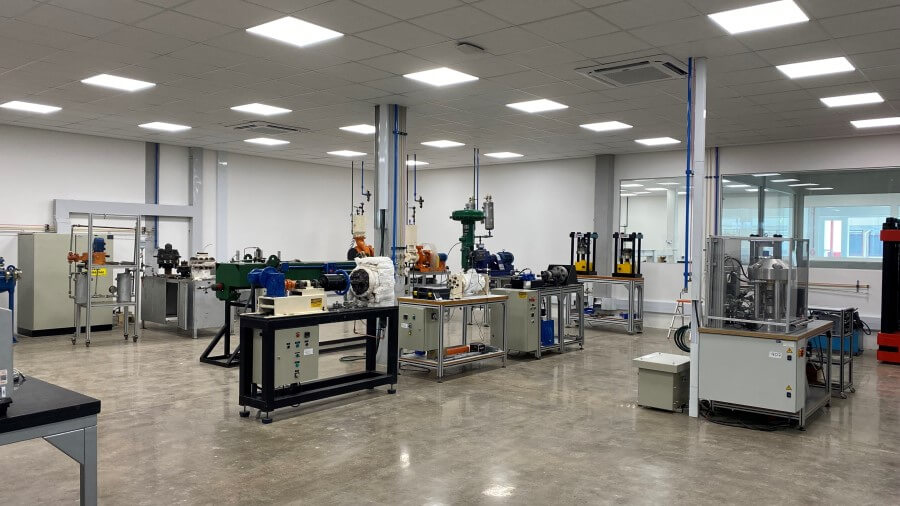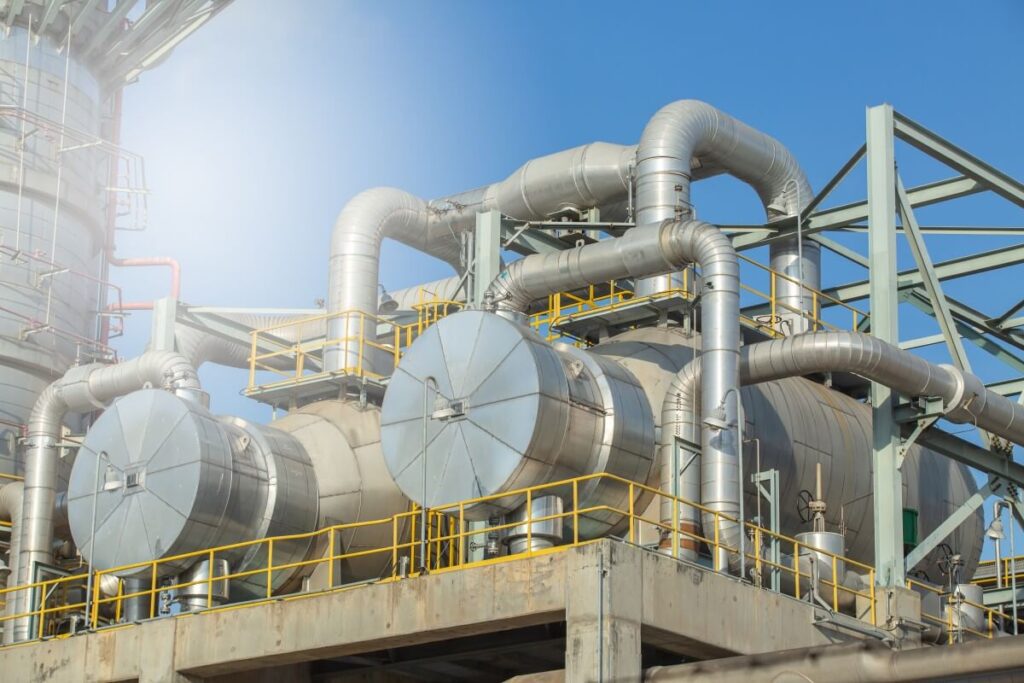By Matjaž Matošec
With a manufacturing and distribution network spanning more than 50 countries, the TEADIT Group is a truly global player. Their comprehensive range of sealing products can be found in a wide variety of applications, including in industries governed by stringent environmental and safety regulations. “If you look at our product lines, it becomes immediately apparent that all we are trying to do is to reduce emissions and create a safe working environment,” says Carlos Girão, TEADIT Group’s Director of R&D. While the company’s green credentials are further strengthened by its growing presence in the biofuels market, the energy transition presents many other opportunities for growth and innovation, which TEADIT is determined to capture. Green hydrogen is one of them, not the least because the company is perfectly positioned to become a major provider of sealing solutions to manufacturers of water electrolysers and hydrogen fuel cells.
PTFE seals for H2 applications
The world is in a race to secure a clean energy transition, and green hydrogen produced by water electrolysis powered by renewable energy is seen as being central to reaching net zero emissions. As electrolyser manufacturers advance existing technologies, develop new ones, and ramp up their production capacities to meet the surging demand, the demand for electrolyser components is mushrooming, too.
Large electrolyser and fuel cells stacks can be comprised of several hundreds of individual cells that must be properly sealed to ensure safe and efficient operation. “A 5 MW alkaline electrolyser requires around 500 seals,” explains Frank Weber, CEO of EMEA and Asia-Pacific, TEADIT. “We are talking about very large seals measuring up to 1.6 metres in diameter, and large quantities, too,” he continues. “Future electrolyser plant capacities will be measured in gigawatts and could require 100,000 seals for each GW of capacity, so the opportunity for companies like ours to help accelerate the scale-up of green hydrogen production globally is immense.”
Due to its excellent sealing properties, PTFE has become a common material of choice for gaskets used in electrolysers. Mr. Weber explains: “Electrolysers are nothing new and have been found in industry for decades. The seals used in the past were often made of asbestos coated with PTFE. Nowadays, however, asbestos is no longer used, so gaskets made entirely of PTFE have become a standard alternative.”
Customisation capabilities
As a nascent industry, green hydrogen production has given rise to many start-ups, while more established electrolyser and fuel cell manufacturers continue to innovate. This has inevitably led to the development of various technological and design solutions, which in turn leads to different component requirements, including seals.

“Currently, most electrolysers are still custom-made, but funding to support mass production of electrolysers is increasing rapidly, especially in Germany,” explains Mr. Weber. “Since we are in the early phase of the transition to fully automated production, we see many customers coming to us with their finished product and saying: ‘do you have a seal for it?’ It would be much wiser and beneficial to approach us in the early stages of product development so that we can develop customised solutions for them. When it comes to PTFE and expanded PTFE, our R&D, engineering expertise, and manufacturing capabilities are difficult to match, globally. This gives us an edge over our competitors and allows us to develop customised sealing solutions perfectly meeting specific needs of our clients and their products. We are able to adjust our manufacturing processes at any stage of their product development, but the sooner we are approached, the higher the level of customisation possible.”
“Our expertise in PTFE is difficult to match, globally.” — Frank Weber
R&D and certifications
With innovation being embedded in TEADIT’s DNA, the company is constantly investing in its R&D capabilities, thus keeping in pace with the evolution of industry trends. “We have a top-class laboratory for testing seals,” proudly asserts Mr. Girão. “We have already invested several millions of dollars in our lab facilities where we are currently testing our products with multiple gases. At the same time, we are working hard to put all the safety precautions in place to increase our testing capabilities with hydrogen, hopefully by the end of this year. Our R&D department is comprised two PhDs, three holders of the MSc degree, and three engineering graduates, so this is a highly qualified staff.”
Product certification is another focus area for TEADIT, as evidenced by multiple certificates and qualifications issued by end users and industry bodies, such as BASF, Shell, NSF, and the American Petroleum Institute (API). “Right now, we are working on obtaining external certification that our sealing products are suitable for hydrogen applications,” explains Mr. Weber. “We already know they are, as do our customers using them, but receiving a formal seal of approval from a third party will be an important achievement as it will provide our existing and future clients with further confidence in the quality of our products.”

New product development
In addition to continuously advancing their sealing solutions, the company is using its know-how to innovate beyond its core products, thereby diversifying TEADIT’s product portfolio, introducing more options and competition to the market, as well as capitalising on its expertise. One of such products currently in development is intended specifically for electrolysis.
“Our R&D department is currently busy working on a cutting-edge technology,” Mr. Girão begins explaining. “More specifically, we have developed a PTFE thread that is meant to serve as a reinforcement of ion-exchange membranes used in various types of electrolysers. Electrolyser membranes are extremely thin and increasingly fragile as their size increases. Reinforcing them with PTFE filaments that are the thickness of a hair provides additional mechanical strength and dimensional stability. This thread is applicable not only to ion-exchange membranes used in green hydrogen production, but to other types of electrolysis, too, including the chlor-alkali process. Only a handful of companies can presently make this product, so we want to expand in this market as we possess both the know-how and manufacturing capability.”

Staying ahead of the curve
For decades, TEADIT has been serving a broad base of industrial customers. However, they realise that the world is changing – a change they are embracing and preparing for. “We are witnessing a shift towards renewables in the global energy mix, with electrification being another major trend,” explains Mr. Girão. “As the energy transition accelerates, the fossil industry is expected to gradually shrink, and that could have important consequences for us if caught unprepared, since gaskets for the oil & gas and refining industries are a big part of our business. So how can we stay ahead of the curve? What can we do to benefit from the changes facing us rather than realising in 20, 30 years from now that a portion of our revenue source is gone? We build, invest, and develop today – for a better tomorrow! We prepare our group for the transition that is already underway and seize the newly emerging opportunities. This will not only help us stay strong but make us even stronger – and better.”
— Carlos Girão
In Europe, which spearheads the deployment of green hydrogen, TEADIT is already participating in working groups on hydrogen-related topics, while at the same reinforcing their business development forces with a PhD in chemistry. “This person will focus exclusively on developing business opportunities in the hydrogen sector, looking for relevant projects and bringing the awareness of our capabilities to the market,” says Mr. Weber. He concludes with a visionary view of how this investment in human resources will benefit TEADIT in the long term: ““This is not about boosting our turnover instantly, but rather about building strong foundations for a bright future.”
New home of ePTFE excellence
In September 2021, TEADIT opened an ultra-modern facility in Kirchbichl, Tyrol, Austria. The new plant comprises a production area of 3,200 m2, storage area of 1,300 m2 and office area of 1,200 m2. The plant supports fully integrated production of ePTFE products ranging from raw-material PTFE powder to sheets, tapes, and gaskets – manufactured in a clean environment that also meets future food and pharmaceutical requirements. In the service centre area, gaskets and stuffing box packings are customised to client requirements. From the central warehouse, sheets (PTFE, ePTFE, CNAF, graphite), ePTFE tapes, as well as stuffing box packings and gaskets are delivered globally. In the medium term, TEADIT will employ around 100 people at this location. The company has five other manufacturing plants worldwide: two in Brazil, and one in the United States, Argentina, and India.

